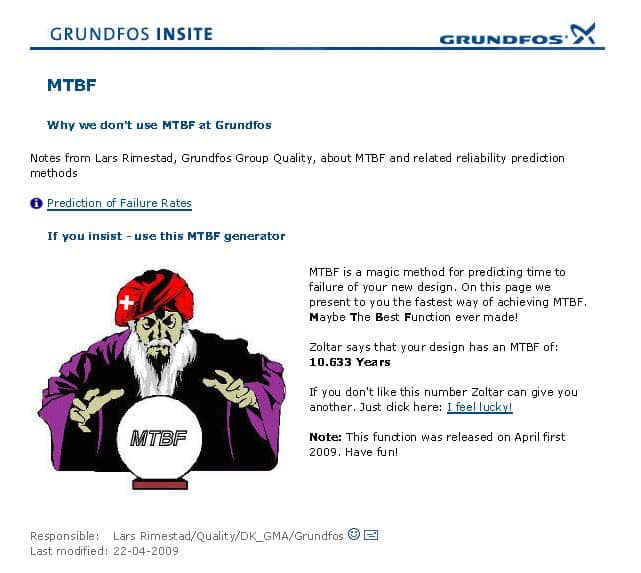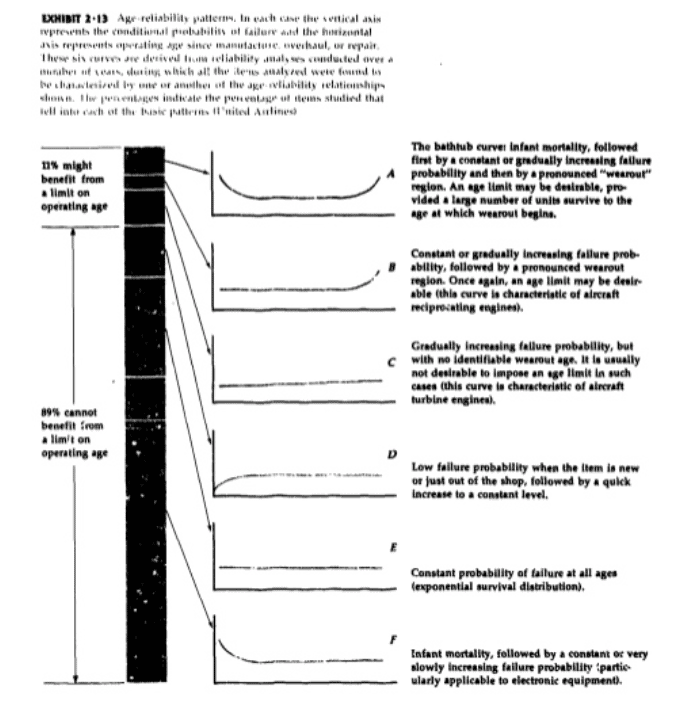A colleague and friend, Bill Barto, worked up an example concerning two pieces of equipment. By simply not assuming a constant failure rate the …. well, let Bill tell the story….
Here’s the story in Bill’s own words via Youtube. [Read more…]
Your Reliability Engineering Professional Development Site
A colleague and friend, Bill Barto, worked up an example concerning two pieces of equipment. By simply not assuming a constant failure rate the …. well, let Bill tell the story….
Here’s the story in Bill’s own words via Youtube. [Read more…]
RAMS is an annual multi track technical conference, rams.org. This year in Orlando and about 400 or so attended. I was rather busy, having two tutorials, and three papers. See my site for a copy of my slides and papers. It was fun, exhilarating, and very enjoyable. [Read more…]

A few months ago at a IEC Dependability standards meeting, I met Thomas Young Olesen of Grundfos and we talked a little about NoMTBF. He said their company has a polity to not use MTBF. YES! So I asked for permission to post some information about the policy.
One interesting part of their internal site was a MTBF Calculator. [Read more…]
Let’s say we have a population and we are interested in the mean (average) of that population’s life. We select a sample (at random if at all possible) and measure a value, like time to failure, for each selected item in the sample.
We calculate the mean life of the sample by summing the sample values and dividing by the number of items in the sample. [Read more…]

I find the world of maintenance a very odd place to find MTBF. While it is possible, that a set of equipment or a machine may actually have a constant failure rate it is the exception rather than all that common. Assuming a constant failure rate doesn’t make it so. [Read more…]
I received a question about setting up an ORT the other day. Below is my response.
—
There is not a hard and fast rule for how much life to take out of a product during ORT and still be able to sell the unit.
There are two different reasons to run ORT and each may take a different approach. [Read more…]

The reason so many use MTBF is because so many use MTBF. ‘Our data sheet has to include MTBF since all the other data sheets have MTBF’. Which seems to be primary reason MTBF is so common. It’s because it is so common.
Against this logic is the desire I have to use a measure of reliability that actually is understood. Using reliability (probability of success over a specified duration) as a measure seems some how odd or novel. It is easy to understand and it doesn’t obscure the reliability. [Read more…]


Normally, we life test a sample of products in order to make sure the products will last as long as expected. We assume that the sample we select will represent the total population of products that we eventually ship. It is not a perfect system, and there is some risk involved. [Read more…]
Thanks to Kirk and the folks at TED for sharing another interesting presentation. Seth Godin: The Tribes we lead is a look at how we each can lead a movement to make real change in this world. Tribes and the organization of tribes has been around a long time, in recent years though those that controlled the mass media tried a different way to influence. [Read more…]
Each of us have seen product life or component reliability claims on product literature or data sheets. We may even have received such claims stated as goals and been asked to support the claim with some form of an experiment. Standards bodies from ANSI, BSI, ISO, IEC, and others from around the world provide standard methods for testing products. This includes product life testing in some cases. [Read more…]
A few weeks ago I was working on a report summary that included a reliability value at 5 years for a product. The document was intended for use with customers, so it was reviewed by Marketing.
Not too many changes, which was nice as I do not consider myself a writer and certainly not a marketeer. They did ask for one change that prompts this note. They wanted the 96% reliable at 5 years to be replaced with the (roughly) 2,100,000 hour MTBF value instead. [Read more…]
Just a short note today about a great high level article in Wired magazine. Robert Capps did a nice summary and review of the significance of reliability engineering, product failure and what we can do about it.
And he doesn’t mention MTBF – which is appropriate.
http://www.wired.com/design/2012/10/ff-why-products-fail/all/
In light of the International Day of Failure, Oct 13th, let’s consider failure from a reliability engineer’s point of view. We work to understand and avoid product failures. When a product fails to deliver the desired performance attribute it is tossed away, returned, replaced, repaired, or tolerated. This may occur before or after the value of the product has been achieved. [Read more…]
Reliability, maintainability, availability, or the ‘ilities’ are common in our language with reference to products, services, equipment, and people. Joe is regularly available for the meeting; We can count on (depend or rely) Sara to finish the report on time; My car starts every morning without fail; and many more. What is meant with these concepts and specifically how do we manage achieving and sustaining business objectives related to these ‘ility’ concepts? The purpose of this short paper [Read more…]